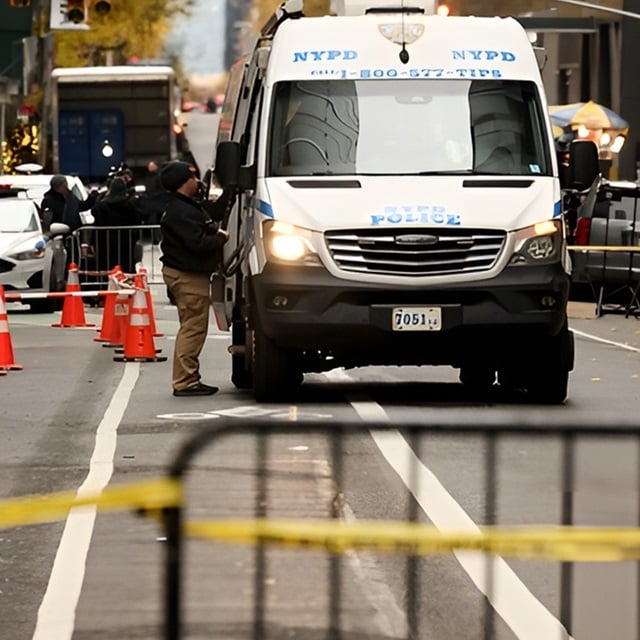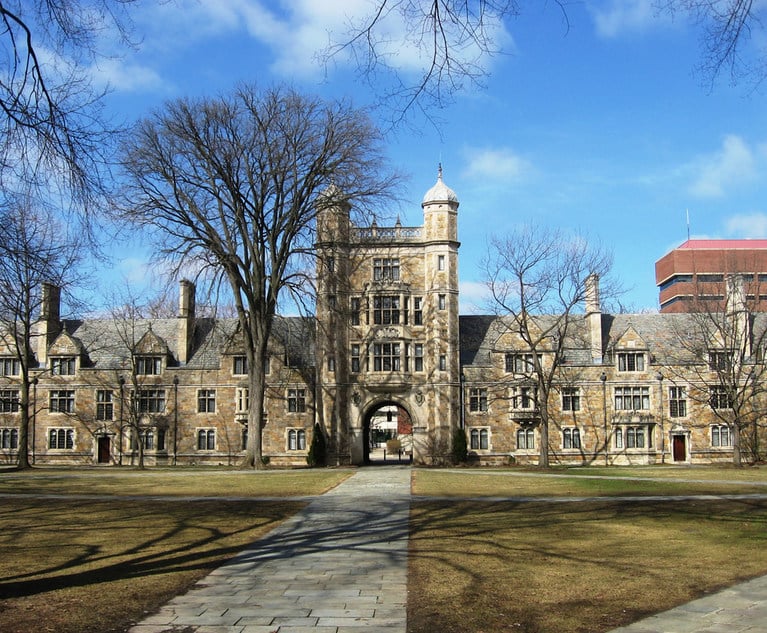Today's SCOTUS Abortion Arguments Will Test Justices' Commitment to Stare Decisis: The Morning Minute
The news and analysis you need to start your day.
December 01, 2021 at 06:00 AM
5 minute read

Want to get this daily news briefing by email? Here's the sign-up.
WHAT WE'RE WATCHING
SHEDDING A TIER - The path to equity partnership in Big Law has, at many firms, grown longer and more harrowing than ever. But there's also evidence to suggest that fewer young lawyers are looking to go down that path in the first place. Now, before we go too far here, let's be clear: plenty of young lawyers still aspire to "make partner" in the traditional sense. They want an equity stake in the firm and all the decision-making power (and responsibility) that comes along with that. (Side note: if you're one of those young lawyers, you should check out our "How I Made Partner" series for inspiration and advice that will assist you on your journey.) But, as we explore in this week's Law.com Trendspotter column, the equity tier is no longer the desired destination for an increasing number of associates. The good news, however, is that there are plenty alternative career paths for those attorneys, often within their existing firms. In fact, there are even some avenues beginning to open up for those lawyers who actually do aspire to become equity partners but are not interested in sacrificing every other aspect of their lives to do it. I'm interested to hear what you think: Should large firms be finding ways to foster the careers of attorneys who don't aspire to be equity partners? What about those who do, but are unwilling to give up their work-life balance? Let me know at [email protected].
STARE INDECISIVENESS - When oral arguments in the legal battle over abortion rights commence today in the U.S. Supreme Court, advocates will face justices who claim loyalty to principles of "stare decisis" but often are bitterly divided over how to apply them, Law.com's Marcia Coyle reports. Stare decisis is the Latin phrase meaning "to stand by the thing decided." And although there is a set of factors that the court uses to weigh whether to overrule a precedent, the doctrine generally directs courts to follow precedent unless there is a "special justification" not to do so. What passes for "special" in any given case? Well, that's not easy to pin down. The justices' comments on abortion have been mostly known through opinions and writings well before the arrival of today's challenge in Dobbs v. Jackson Women's Health Organization. In that case, the state of Mississippi is urging the court to overrule its landmark abortion rights decisions, Roe v. Wade and Planned Parenthood v. Casey. But less well known is how those views will influence their application of stare decisis. Each of the current justices was questioned during Senate confirmation hearings about the importance of stare decisis and each paid homage to its importance to maintaining stability in the law and to protecting the court's legitimacy. But as recent rulings show, its application often appears to be more subjective than principled. Stay tuned for more coverage and analysis of today's SCOTUS arguments on Law.com.
AT WHAT COST? - Uber was hit with a consumer class action Tuesday in New York Southern District Court over the rideshare app's "upfront pricing" feature, which is meant to provide the total cost of a ride before selection. The complaint, brought by Reese LLP, accuses Uber of intentionally misleading consumers by ultimately charging a final cost that is higher than the upfront price shown. Counsel have not yet appeared for the defendant. The case is 1:21-cv-10155, Spates v. Uber Technologies Inc. Stay up on the latest deals and litigation with the new Law.com Radar.
EDITOR'S PICKS
WHILE YOU WERE SLEEPING
SO WE MEET AGAIN - Baker McKenzie has scrapped an initiative designed to reduce stress among its U.K. workforce. As Law.com International's Hannah Walker reports, the firm has pulled the plug on its "well-being Wednesday" initiative, which had encouraged its people to keep Wednesdays free of internal meetings, and to keep between 1 and 2 p.m. completely meeting free. The measure had been implemented just under a year ago, initially in its U.K. ranks. So did the firm solve the problem of stress in the legal profession once and for all during that time? Well… no. But it did learn a few things about how to approach the issue. One London partner said: "We thought it was a great idea, but it worked better when we were all remote. It did not work perfectly because it's a global law firm and because we all do tons of stuff with other firms and offices." Still, he added: "It didn't have long term value, but it doesn't mean it didn't serve a purpose." The firm is now "encouraging" its people to "set aside some time in the mornings and at the end of the day" to disconnect, and spend less time on Zoom calls, the partner added.
WHAT YOU SAID
"There are a lot of what-ifs … but I don't see a slowdown coming in M&A. There's still a lot of pent-up demand and we expect 2022 to be strong."
This content has been archived. It is available through our partners, LexisNexis® and Bloomberg Law.
To view this content, please continue to their sites.
Not a Lexis Subscriber?
Subscribe Now
Not a Bloomberg Law Subscriber?
Subscribe Now
NOT FOR REPRINT
© 2025 ALM Global, LLC, All Rights Reserved. Request academic re-use from www.copyright.com. All other uses, submit a request to [email protected]. For more information visit Asset & Logo Licensing.
You Might Like
View All

From Laggards to Tech Founders: Law Firm Innovation Is Flourishing

Inside Track: Cooley's Modest Proposal to Make Executives Safer

Law School Applications are Up Across the Country. Law Deans Aren't Sure Why
6 minute readLaw Firms Mentioned
Trending Stories
- 1States Accuse Trump of Thwarting Court's Funding Restoration Order
- 2Microsoft Becomes Latest Tech Company to Face Claims of Stealing Marketing Commissions From Influencers
- 3Coral Gables Attorney Busted for Stalking Lawyer
- 4Trump's DOJ Delays Releasing Jan. 6 FBI Agents List Under Consent Order
- 5Securities Report Says That 2024 Settlements Passed a Total of $5.2B
Who Got The Work
J. Brugh Lower of Gibbons has entered an appearance for industrial equipment supplier Devco Corporation in a pending trademark infringement lawsuit. The suit, accusing the defendant of selling knock-off Graco products, was filed Dec. 18 in New Jersey District Court by Rivkin Radler on behalf of Graco Inc. and Graco Minnesota. The case, assigned to U.S. District Judge Zahid N. Quraishi, is 3:24-cv-11294, Graco Inc. et al v. Devco Corporation.
Who Got The Work
Rebecca Maller-Stein and Kent A. Yalowitz of Arnold & Porter Kaye Scholer have entered their appearances for Hanaco Venture Capital and its executives, Lior Prosor and David Frankel, in a pending securities lawsuit. The action, filed on Dec. 24 in New York Southern District Court by Zell, Aron & Co. on behalf of Goldeneye Advisors, accuses the defendants of negligently and fraudulently managing the plaintiff's $1 million investment. The case, assigned to U.S. District Judge Vernon S. Broderick, is 1:24-cv-09918, Goldeneye Advisors, LLC v. Hanaco Venture Capital, Ltd. et al.
Who Got The Work
Attorneys from A&O Shearman has stepped in as defense counsel for Toronto-Dominion Bank and other defendants in a pending securities class action. The suit, filed Dec. 11 in New York Southern District Court by Bleichmar Fonti & Auld, accuses the defendants of concealing the bank's 'pervasive' deficiencies in regards to its compliance with the Bank Secrecy Act and the quality of its anti-money laundering controls. The case, assigned to U.S. District Judge Arun Subramanian, is 1:24-cv-09445, Gonzalez v. The Toronto-Dominion Bank et al.
Who Got The Work
Crown Castle International, a Pennsylvania company providing shared communications infrastructure, has turned to Luke D. Wolf of Gordon Rees Scully Mansukhani to fend off a pending breach-of-contract lawsuit. The court action, filed Nov. 25 in Michigan Eastern District Court by Hooper Hathaway PC on behalf of The Town Residences LLC, accuses Crown Castle of failing to transfer approximately $30,000 in utility payments from T-Mobile in breach of a roof-top lease and assignment agreement. The case, assigned to U.S. District Judge Susan K. Declercq, is 2:24-cv-13131, The Town Residences LLC v. T-Mobile US, Inc. et al.
Who Got The Work
Wilfred P. Coronato and Daniel M. Schwartz of McCarter & English have stepped in as defense counsel to Electrolux Home Products Inc. in a pending product liability lawsuit. The court action, filed Nov. 26 in New York Eastern District Court by Poulos Lopiccolo PC and Nagel Rice LLP on behalf of David Stern, alleges that the defendant's refrigerators’ drawers and shelving repeatedly break and fall apart within months after purchase. The case, assigned to U.S. District Judge Joan M. Azrack, is 2:24-cv-08204, Stern v. Electrolux Home Products, Inc.
Featured Firms
Law Offices of Gary Martin Hays & Associates, P.C.
(470) 294-1674
Law Offices of Mark E. Salomone
(857) 444-6468
Smith & Hassler
(713) 739-1250








